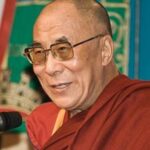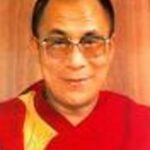More and more people in the West are being exposed to the teachings of the Buddha through books, Internet sites, and even the news about the Dalai Lama and the monks in Burma. Buddhism is an ancient, gentle path that has much to appeal to modern people, looking for answers and looking for peace.
There are perhaps as many reasons to become a Buddhist as there are people, so for now, let’s assume that you yourself have decided for your own reasons that you would like to make a commitment to become a Buddhist. How do you begin?
To become a Buddhist, you “take refuge” in the Buddha, the Dharma, and the Sangha. Notice that we refer to “the Buddha,” because the word Buddha is not his name. His name was Siddhartha Gautama, and during his lifetime, centuries before Christ, he became the Buddha, the enlightened one. He is not the one and only Buddha, just the latest in a series of Buddhas. Nor is Siddhartha Gautama the last of the Buddhas. Buddhists already teach about Maitreya, who will be the next Buddha.
Think about the president of the United States. If I ask you who the president of the United States is, you know the answer. But, there was a different answer (because there was a different president) twenty years ago, just as there will be a different answer twenty years from now.
The Dharma (or the Dhamma) is the teaching of the Buddha. Most of the original Buddhist texts are written in either Sanscrit or Pali, two languages that are related to each other. For instance, in Pali, the word is Dhamma, in Sanscrit, Dharma, just as the word Sanscrit word karma (which names a very important, but frequently misunderstood concept in Buddhism) is kamma in Pali.
The Sangha traditionally meant the order of monks and nuns. In modern times, the word sangha has come to be used almost in the sense of congregation, the Buddhist group to which one belongs. The importance of taking refuge in the Sangha, however you define it, is that to undertake to be a Buddhist means you must have some context. There are many forums and groups on the Internet and in MySpace and FaceBook. There is also a “World Buddhist Directory,” where you may be surprised to find Buddhist centers in your area.
You may ask a Buddhist monastic to listen to you as you take refuge. If one is not available for you, you may take refuge before an image of the Buddha (and, again, there are many Buddhist images available on the Internet). You may ask friends of yours to join you. Traditionally, you would kneel, then bow three times to the image, touching your forehead to the floor. That may strike you as odd, it may even strike you as idol worship, but to bow before a statue of the Buddha is no more to worship that statue than to salute the flag is to worship the flag. Kneeling and bowing, although they have little place in modern society, give us a posture of humility, of being open and ready to take refuge, to turn our lives over to something or someone outside ourselves.
You can speak your refuge vows in the ancient Pali language, but it may be more meaningful to speak the words in your own language. What is going on in your mind is much more important than the words that you speak or the gestures that you make. Traditionally, you would kneel, and put your palms together at your chest. Compose yourself, calm your mind and bow three times to the image such that your palms and forehead touches the floor. Then recite the following formula:
I take refuge in the Buddha.
I take refuge in the Dharma.
I take refuge in the Sangha.
For the second time, I take refuge in the Buddha.
For the second time, I take refuge in the Dharma.
For the second time, I take refuge in the Sangha.
For the third time, I take refuge in the Buddha.
For the third time, I take refuge in the Dharma.
For the third time, I take refuge in the Sangha.
Why three times? Why not? The whole process is not really designed to break your spirit, but it does require a certain suspension of your own ego. You are no longer a citizen of this world. You are a refugee, on a spiritual journey.
Buddhism is not so much about “being Buddhist” as about doing right. Nothing really changes when you take refuge. You are simply continuing your same jouney, just, perhaps, with a better perspective on where you are going, as well as on where you have been.
If you have questions about Buddhism that you would like for me to explore, please let me know.




